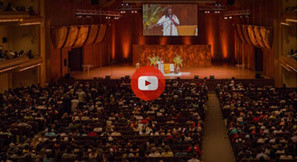
Whenever you expect anything from others, appreciation or anything else, you are not being independent, and this is bound to bring you down. You must say, “I don’t expect anything from others, but whatever I need to do, I will keep on doing it.”
First of all, honor all religions. The real problem is that they don’t know their own religion completely. Tell them to first understand their own religion, study and go deep into it and then decide.
When you are converting religions, you are implying that this religion is not good, which is why I am taking another one. If you go into the root of any religion, you realize that all religions are one. And so you honor, learn from everybody and grow spiritually.
Conversion should be from the head to the heart, from badness to goodness and not from one religion to another.
India was under foreign rule for many centuries. After going through all that, with a population that is three times that of America, with only one-third of their land mass, with 600 dialects and 28 languages, the country is the equivalent of a continent, and yet, it is progressing. Why don’t you see this positive side?
If you go to any village today, even in the slums, they have televisions. When we came to this area in Bangalore, there wasn’t a single tiled roof. Everywhere, in all the villages, there were only thatched roofs. (I also liked the thatched roof but when it rains, it would leak.) Today, do you see any thatched roofs at all? No!
India is growing very fast. In spite of seven religions in this country and so many languages, yet there is harmony. We have relatively less number of mental hospitals or even cases of depression. Of course, we have our negative side; there is corruption, uncleanliness, lethargy and indifference.
Last year, there was this huge cry of India being intolerant; I would say that India is not intolerant, it is indifferent. We should have some more intolerance towards corruption and injustice, but we don’t do that, we take it all in our stride. This is where we need to wake up.
At the same time, there are many positive things. There are so many large-hearted people in this country. If you go to a village, they may have only one glass of buttermilk, yet they will share half of it with you. There is still that feeling of caring and sharing in every village here. It may not be the case with urban cities; they have become the same all over the world.
If you see only the negative side, you will feel there is no hope. Then you will say, “This is so corrupt, let me also become corrupt.” Your motivation to stand up against corruption will die. But if you see the positive side, then you will have the motivation to stand up. Whenever you see the negative, you should see the positive side also. If you had these problems anywhere in Europe, India would have become like the former Yugoslavia or the Balkan States and broken up into pieces. What is it that unites the whole country? It is spirituality!
(Laughter) It is not necessary to keep on bathing like this. You need to be clean but you can just wash your hands before you say your prayers, that is good enough. Dogs are also a part of God. We don’t bathe for God, we bathe so that we are clean, God will accept us as we are! It is only the neighbors who will have a problem if we don’t bathe! (Laughter)
Even with regard to fasting, people misunderstand it to be something we are doing for God. You are not doing it for God. God is like your mother, or your father; would they like it if you stay hungry? Or if you bargain with them saying that you will fast until they accept your demands? Parents know when to give what to their children; They know better than you. Similarly, God knows what and when to give you, so don’t fast for God; fast to cleanse your body and mind.
Ekadashi (eleventh day of the fortnight) fasting has a very scientific reason; it is done three days before the full moon or new moon day, to cleanse the body. It is said one should eat only fruits or drink fruit juice. This change in your food intake eliminates the toxins in the body, which could otherwise cause diseases. These toxins in the system get aggregated during full moon and new moon, so to keep the body healthy it is suggested that we fast, and not to keep God happy.
Yes, this is true especially in Tamil Nadu, but not in Karnataka. If you see the temples in Karnataka, they are kept very neat and clean. We need to teach the people in Tamil Nadu to maintain cleanliness.
Often people come to the temple, break a coconut and spill the water all over and then leave in a hurry. This is because the people are too caught up in rituals in Tamil Nadu. In North India that is not the case. In the North, they sit and sing bhajans, and the temples are kept fairly clean. Of course, there are some temples there also which are dirty. We need to educate the priests of the temples to keep temples clean.
The thevarams (hymns) that are sung in the temples are so beautiful. They address God saying ‘You are my wealth, you are my honey, my eyes, my everything’. This is a very unique way of addressing God as my beloved. When these songs are sung, the meanings should also be explained to people; otherwise, they chant in some language that nobody understands, and people don’t connect. They just go to the temple, do some rituals and leave the temple.
Actually, when you go to a temple, you should sit there for some time and then come. But what do people do? They do an act of sitting down and getting up in 10 seconds or less, they pretend as though they sat. Why? Because it is part of the rules that if people don’t sit in the temple, then they won’t get any benefits. This is written in the temple’s rules and regulations. That won’t help; sitting means what? They should sit in meditation. There are a thousand pillars in many of the temples in Tamil Nadu. These pillars are meant for people to sit and meditate, and go deep inwards, but nobody does it.
Even the aarti that is done, nobody understands why they do it! In aarti, you light a camphor and say to God ‘Let my life keep going around you only, and not away from you. Let your thoughts linger on in my mind all day and night’. This is the prayer. Our life is like a flame. If you light a candle and turn it upside down, the flame still goes up. Like that, you pray, ‘Let my enthusiasm, my life and values always go up, and let it always be around you’. This is the feeling behind the aarti, but we don’t understand it.
Why do you break a coconut in the temple? Our body is compared to a coconut. Body should be strong like the shell. The mind should be like the white kernel inside, and your heart or feelings should be like the sweet water. So by breaking the coconut, you say, ‘I keep my emotions and feelings, like the sweet water, in front of you.’
You need some rituals to express your feelings, e.g., when someone dear to you comes, you greet them with flowers. In the ancient days, they did these rituals. Whatever God is doing to you, you say, ‘I am going to replicate, do the same to you.’ Like when children play, they say, ‘I have become a doctor, and I am going to test you or I am making coffee and you should drink!’
There is a joy in playing like that; puja is the same (concept). God has given you rain, so you offer him water. He has given you rice, fruits so you also offer rice and fruits. Such practices are also there in Buddhism, Jainism, Hinduism and Sikhism. This has been developed in the East and is also done in Islam and Christianity; you offer candles and flowers in Christianity. In Islam, you go to the Darga, spread a sheet, offer prayer beads and flowers. If these rituals are not done with feelings, then there is no purpose in doing them, and it is not compulsory that you have to do it.
In the olden days, temples were not just places of worship; they were centers of culture where dance, music and poetry would flourish. It was a meeting place for community people to get together, there were no separate community halls those days. Weddings happened in temples, there was art and architecture. You see the Meenakshi temple in Madurai, see the amount of paintings and carvings there, it is unbelievable.
When I was in Hyderabad, they took me to this 1,000 pillars temple, which was dilapidated. The beauty was that you could pass a fine thread through those stone carvings. It is a wonder as to how they carved such needles without breaking the stones, where only a thread could pass through; we had some amazing workmanship then. Temples were the kind of places where all this was exhibited, so we definitely need to keep them clean. We need to educate people; knowledge of all this is necessary.










